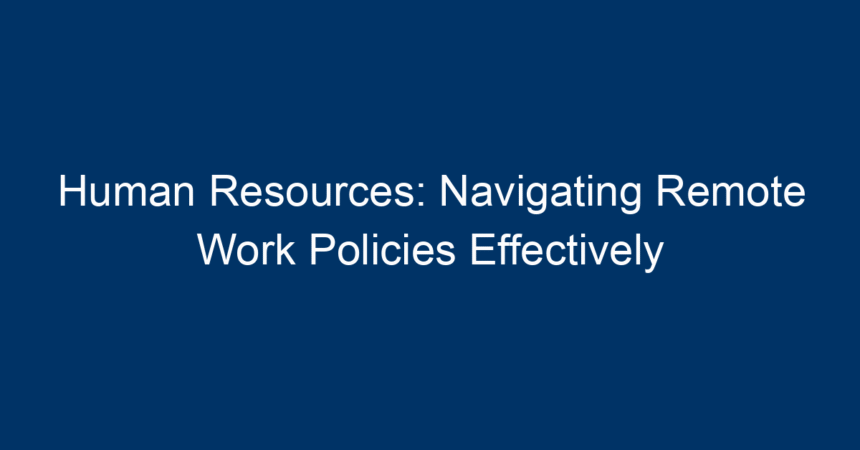In recent years, the landscape of work has dramatically evolved, leading to a significant shift towards remote employment. As organizations adapt to this new reality, human resources (HR) departments play a pivotal role in shaping effective remote work policies. The challenge lies in creating frameworks that foster productivity, engagement, and well-being while maintaining organizational culture across distances. In this article, we will explore essential aspects of remote work policies and offer actionable insights for HR professionals tasked with navigating this complex terrain.
Understanding Remote Work: A New Norm
The rise of remote work is often attributed to the need for flexibility and work-life balance. The COVID-19 pandemic accelerated this trend, forcing many organizations to adopt remote work policies almost overnight. According to a Stanford study, remote work can increase employee productivity by up to 13%. However, a one-size-fits-all approach doesn’t apply to remote work. Here, human resources must tailor policies to align with both organizational objectives and employee needs.
The Role of Human Resources in Remote Work Policy Development
Human resources serve as the backbone of any organization, particularly in developing remote work policies. HR professionals must ensure that policies are not only compliant with legal regulations but also supportive of employee well-being. This complex task involves several key components:
-
Policy Creation and Documentation
- Develop clear, concise, and transparent remote work policies outlining expectations, responsibilities, and communication protocols.
-
Employee Engagement and Communication
- Foster a culture of open communication to keep remote employees engaged. Regular check-ins and feedback loops are vital for maintaining connection and motivation.
- Compliance and Legal Considerations
- Ensure that remote work policies comply with labor laws and regulations, including those concerning overtime, wages, and benefits.
Crafting Clear Remote Work Policies
Creating effective remote work policies begins with thorough research and consideration of the unique dynamics of your organization. Here are key elements that HR should focus on while crafting these policies:
1. Define Remote Work Eligibility
Not all roles within an organization can be performed remotely. HR should establish criteria for determining which positions are eligible for remote work. This can include factors like job responsibilities, employee performance, and team dynamics.
2. Set Clear Expectations
Establishing expectations is crucial for a successful remote work policy. HR professionals should communicate:
- Work Hours: Clarify expectations regarding availability and work-life balance.
- Performance Metrics: Define how success will be measured, including deliverables and timelines.
- Communication Protocols: Specify preferred communication tools and frequency of check-ins (e.g., daily stand-ups, weekly reviews).
3. Provide Essential Tools and Technology
To support remote employees effectively, it’s essential to equip them with the necessary tools and technology. This includes:
- Collaboration Tools: Platforms like Slack, Microsoft Teams, or Zoom facilitate communication and collaboration.
- Project Management Software: Tools such as Asana or Trello help in tracking tasks, deadlines, and team progress.
- Technical Support: Offering remote IT support ensures employees can resolve issues swiftly.
4. Foster a Healthy Work Environment
Promoting mental and physical well-being is crucial in a remote setting. HR should consider implementing:
- Wellness Programs: Initiatives focused on mental health support, stress management, and work-life balance.
- Virtual Team-Building Activities: Regular social interactions, even virtually, can reduce feelings of isolation.
Training and Development in a Remote Landscape
Employee development shouldn’t be compromised due to remote work. Human resources must prioritize ongoing training and development to keep skills sharp and maintain engagement. Key strategies include:
1. Implementing Online Training Programs
Investing in online learning platforms can enhance employee skills while accommodating their schedules. Topics might include:
- Time Management: Optimal strategies to increase productivity while working remotely.
- Effective Communication: Training on how to communicate effectively in a virtual environment.
2. Personalized Development Plans
Human resources should work with employees to create customized development plans tailored to their career goals. These can include mentorship opportunities or access to professional certifications.
Evaluating and Adapting Remote Work Policies
Given the ever-evolving nature of remote work, continuous evaluation and adaptation of policies are essential. Regular feedback from employees can provide valuable insights into areas for improvement. Here’s how to implement this effectively:
1. Create Feedback Mechanisms
Establish channels for employees to provide anonymous feedback on remote work experiences. Regular surveys can facilitate open communication and spur discussions on policy adjustments.
2. Analyze Performance Data
Monitoring performance through metrics and KPIs is vital in assessing the effectiveness of remote work policies. HR should regularly review data to make informed adjustments.
Building a Strong Remote Company Culture
A compelling company culture can thrive even in a remote environment. HR plays a vital role in cultivating this culture through various strategies:
1. Recognition Programs
Implementing recognition programs can improve employee morale and motivation. Consider monthly awards or shout-outs during team meetings to celebrate achievements.
2. Promote Diversity and Inclusion
Inclusivity should be a priority in remote work environments. HR should ensure policies support diversity, equity, and inclusion, fostering a sense of belonging among all employees.
Conclusion: Actionable Insights for Human Resources
Navigating remote work policies is a multifaceted challenge, but human resources are well-equipped to tackle it. Here are actionable insights for HR professionals:
- Be Transparent: Clear communication fosters trust and sets expectations for remote work.
- Invest in Technology: Provide employees with effective tools that enhance productivity and collaboration.
- Encourage Feedback: Create an environment that values employee input, enabling continuous improvement in policies.
- Focus on Well-Being: Prioritize employee health through wellness programs and mental health support.
- Cultivate Culture: Engage employees in team-building activities that strengthen company culture even in a virtual environment.
As we continue to navigate the complexities of remote work, human resources will remain at the forefront, advocating for policies that support both organizational goals and employee well-being. Embracing this challenge will not only refine remote work practices but also position organizations for success in the future of work.




